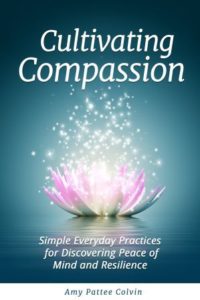The holidays are upon us, bringing a whirlwind of festivities, family gatherings, and that undeniable urge to deck the halls with boughs of holly—or, you know, at least a string of twinkling lights. It’s a time for joy, connection, and celebration, but let’s be honest, it can also be a time of stress, overwhelm, and getting swept away in the hustle and bustle. Cultivating compassion can be your pathway to presence in those chaotic moments.
In the midst of all the excitement—and perhaps a bit of chaos—it’s easy to lose sight of what truly matters: presence. Being present means savoring each moment, appreciating the simple joys, and connecting deeply with ourselves and those around us. But how do we cultivate presence when our to-do list is longer than Santa’s naughty-or-nice scroll?
Compassion—that profound capacity to be aware of, then emotionally moved by the suffering or distress of others and ourselves, followed by a desire to take action to alleviate the pain—has a remarkable way of grounding us in the present moment.
When we extend compassion, our focus shifts from our own worries and anxieties to the needs and experiences of those around us. We become more attuned, more empathetic, and more grateful for the simple gifts of connection and shared humanity.
The Science of Presence and Compassion
Neuroscience is now catching up with what ancient wisdom traditions have known for centuries: compassion has a profound impact on our brains and emotional well-being. Studies have shown that practicing compassion may increase activity in the areas of the brain associated with happiness and emotional regulation. It may also reduce activity in the areas associated with stress and anxiety.
Tanya Singer’s groundbreaking research reveals a fascinating distinction between empathy and compassion. While both involve understanding another’s suffering, empathy alone can lead to emotional overwhelm as the pain centers in our own brains activate. Compassion, however, with its inherent call to action, lights up different neural pathways associated with reward, motivation, and caregiving. This means that by actively wishing others well and taking kind action, we shift out of painful empathy and into a state of open-hearted peace, benefiting both ourselves and those we care for.
In essence, compassion helps us rewire our brains for greater peace and well-being. And when we’re feeling grounded and centered, it’s much easier to be present and appreciate the beauty of each moment.
Compassion in Action: Finding Presence in the Everyday
Compassion isn’t just a lofty ideal. It is a practice we can cultivate in our daily lives. Listening to someone attentively without being distracted, doing something nice unexpectedly for someone, and being grateful for simple joy all boost our mood help ground us. Below are three actionable examples of how compassion can bring us into the present moment.
- Deep listening: When we truly listen to someone with our full attention and empathy, we create a space for genuine connection and understanding. We’re not just waiting for our turn to speak; we’re fully present with the other person, absorbing their words and emotions. The other day, I was chatting with a friend who was feeling overwhelmed by the holiday season. Instead of jumping in with solutions or sharing my own experiences, I simply listened with my full attention. I noticed her body language, her tone of voice, and the emotions behind her words. By truly being present with her, I created a space for her to feel heard and supported.
- Acts of kindness: Offering a helping hand, a kind word, or a thoughtful gesture can shift our focus from our own needs to the needs of others. These acts of compassion, no matter how small, can create ripples of positivity and bring us into the present moment. Last week, I saw an elderly woman struggling to open the door to the post office. Without hesitation, I offered to help her and even carried some of her packages to the counter. It was a small act of kindness, but it brought a smile to her face and filled me with a sense of warmth and connection. In that moment, I was fully present, focused on helping another being, and my own worries faded away.
- Appreciation for simple joys: Taking a moment to appreciate the beauty of a winter sunset, the warmth of a hug, or the laughter of loved ones can fill us with gratitude and connect us to the present moment. Compassion helps us see the world through a lens of appreciation, noticing the good, and finding joy in the everyday. Yesterday, I took a walk in the woods with my dog. As we strolled along the path, I noticed the sunlight filtering through the trees, the crispness of the air, and the joyful wagging of my dog’s tail. These simple joys filled me with gratitude and a deep sense of connection to the present moment. Compassion helps us see the world through a lens of appreciation, noticing the good, and finding joy in the everyday.
Cultivating Compassion: Holiday Stress Relief
Ready to embrace compassion as your pathway to presence this holiday season? Here’s a simple practice you can try.
Begin by finding a place where you can be relaxed and comfortable. Then drop your gaze or close your eyes, and breathe deeply and fully. Simply enjoy this process of intentional breathing for a moment. Then:
- Bring to mind someone you love dearly in some sort of holiday setting. Silently repeat these phrases, directing them towards that person: “May you be well. May you be happy. May you be free from suffering.”
- Visualize yourself in a holiday setting, and silently repeat these phrases for yourself: “May I be free from suffering. May I be kind to myself and accept myself as I am. May I be at ease, at peace, and filled with joy.”
- Bring to mind someone you recognize but don’t know well in some sort of holiday setting. Silently repeat these phrases, directing them towards that person: “May you be well. May you be happy. May you be free from suffering.”
- Bring to mind someone you find to be difficult in some sort of holiday setting. Silently repeat these phrases, directing them towards that person: “May you be well. May you be happy. May you be free from suffering.”
- Now expand your awareness to all beings everywhere and silently repeat these phrases, directing them toward these beings: May all beings be well. May all beings be happy. May all beings be free from suffering.”
This practice cultivates feelings of warmth, kindness, and connection. It can be used at any time to help you shift into a more compassionate and present state of being.
Embrace the Gift of Compassion
As you navigate the holiday season, remember the power of compassion to bring you into the present moment and create a more meaningful experience. Whether you’re sharing a meal with loved ones, volunteering your time, or simply taking a quiet moment to appreciate the beauty around you, let compassion be your guide.
Embrace the gift of compassion, and discover a holiday season filled with presence, joy, and connection. If you’d like to learn more about deepening compassion and connecting with present-moment awareness, join an upcoming training BodyMind IntelliSense Transformation System or Compassion Cultivation Training program. Through these courses, you’ll deepen your compassion, cultivate gratitude, and begin walking the pathway to presence.








